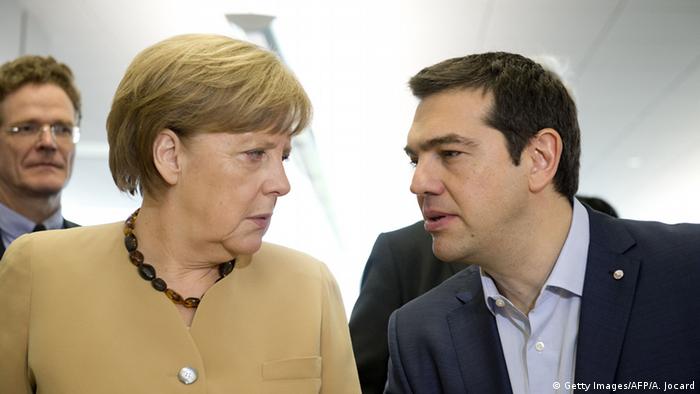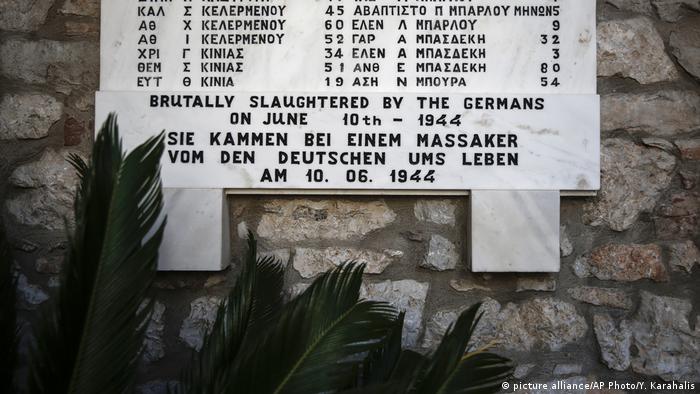You could not be only collected during the state visit of Federal President of Germany Steinmeier in Greece, but soon also from Poland.

The issue of reparations burdened the Greek-German relations for decades. The Germans, with their occupation in the Second world war, endless suffering on Greece: According to official Greek figures, 300,000 people were killed. The occupiers drained the country economically, was later destroyed in their retreat, the infrastructure. They pressed the Greek Central Bank, a Forced loan of today, the equivalent of about ten billion euros. Back the has not been paid.
Nevertheless, reparation payments to the Federal government are not an issue. Government spokesman Steffen Seibert said on Wednesday to a question from the Deutsche Welle: “Our position is that the question of German reparations, is legally regulated, politically, finally.” The Federal government continually refers to two agreements. 1960 had been paid under an agreement with several European governments 115 million D-Mark. There was also a “comprehensive System of reparations rules” that should also come to Greece. Furthermore, in the Two-plus-four Treaty after the German reunification in 1990 that no further reparations be provided””.

Greece’s Prime Minister Tsipras has raised the issue of reparations on several occasions
Government spokesman Steffen Seibert added on Wednesday: “There is no official move by the Greek government.” Not new, he could say, because there has been over the years a whole series, especially at the height of the Greek sovereign debt crisis, as of 2015, the left government of Tsipras came to Power. Yet another attempt could be coming soon. At the end of September Minister Nikos Kotzias said after a Meeting with his German counterpart, Heiko Maas, in Athens: “What is historically correct, one must address at the appropriate time and in the appropriate way and at the right hour.” The hour is coming, possibly in December. Then Parliament President Nikos Voutsis want to submit to the plenary a report of the reparations Commission. The demands for reparations after DW are estimated-information on approximately 300 billion euros.
Fear of the precedent
But what are the chances Greece would have to collect the receivables. The Berlin state rights activist Prof. Ulrich battistotti said the DW: “you have tried several times, before national and international courts. They have so far had no success.” Nevertheless, “I would not rule out the chances.”
The London debt agreement, which had entered the old Federal Republic in the 50s with former opponents in the war, it was agreed that the final cleansing of German war debts, a Treaty of peace remain reserved. In the Wake of German reunification, the German side have avoided then, as showing a, “consciously, to conclude a peace Treaty”. Instead, it was said then: Two-plus-Four Treaty. It was so baptistery, the German Position: “There is no peace Treaty, therefore, you will get nothing”. However, “legal Tricks”, as Prime Minister Tsipras has said, don’t be, says battistotti, because: “All who were involved, have signed. We dictated nothing.”

Memorial plaque to the memory of the massacre of Distomo
Ultimately, it’s Berlin, but probably less to Greece than to avoid a precedent: Would Greece could provide dozens of other former opponents of the war and occupied countries are also demands for reparations. It is likely to make the Federal government to take notice, that there is also in Poland’s aspirations to demand reparations. The Greek and the Polish reparations Commission to work together even, together, put pressure on the Federal government to exercise. “Yes, there was a Meeting in a narrow circle,” confirmed the President of the reparations Commission in the Greek Parliament, Triantafyllos Mitafides, like its Polish counterpart, the PiS MP, and Germany connoisseurs Arkadiusz Mularczyk, compared to the DW. “Some of the points from the Greek report were very helpful to us,” said Mularczyk. “Our report will, however, be much more accurate.”
The Polish representative of the Commission, spoke at the Meeting in Athens with the Greek lawyers who have represented the victims of the massacre of Distomo. In the village, the SS killed in June of 1944, approximately 218 people, including many elderly, women, and children, and burned down the houses. A Greek court sentenced, in 1997, the Federal Republic of Germany, in the first instance, to pay nearly 40 million euros. Germany refused, and the sentence. Such a request by the victims to the European court of human rights was rejected, however. “In Poland, we have thousands of such villages,” said Mularczyk compared to the DW.
With the theme, you can score points in domestic politics
Accordingly, the higher the Polish claims. The reparations Commission of the Sejm of it has estimated at around 740 billion Euro. At the beginning of 2019 Mularczyk want to present the report to the Public. Only then it will show whether Poland will officially make demands. So far, the theme of the government will only be discussed to the public.

The German invasion of Poland: “We have a thousand such villages”
Both Athens and Warsaw hope that Germany will show with increasing pressure to be more open. “We proceed from the assumption that Berlin would try to resolve our concerns individually,” says Mularczyk, thinks further: “we Should not come there, there is also the Option of a cooperation with the aim of ‘internationalizing the issue'”.
The Greek-Polish cooperation is a politically sensitive one. The national-conservative PiS government in Warsaw, the left-led Syriza in Athens. There is little that unites both political. But the reparations question. This is also true for their domestic political importance: In both countries next year will be elected a new Parliament. In addition, European elections are held. And both in Poland and in Greece, with demands for reparations points. In Poland, more than half of the respondents would find it, according to polls, well, if Poland’s reparation claims against Germany argued.
On the question of the German wave, whether the German government knew of a possible collusion between Poland and Greece in the reparation question, government spokesman Steffen Seibert, meanwhile, buttoned up: “to be Honest, I have no information, and it would also be amazing if I had information about possible collusion between Poland and Greece. I don’t have you.”

